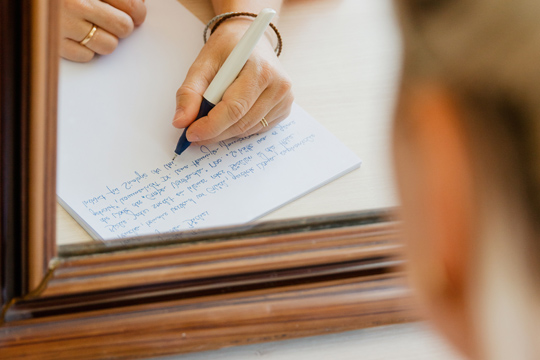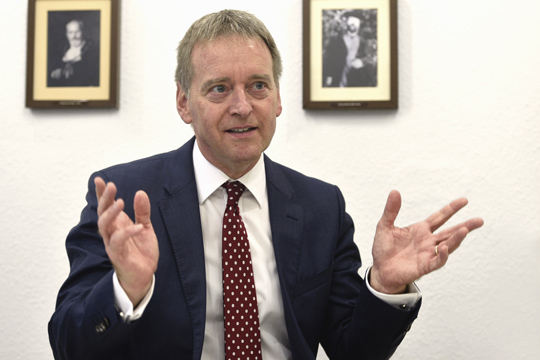Can you plagiarize yourself?
Freiburg, Oct 17, 2019
This year, Freiburg University is holding its discussions on academic integrity for the fifth time. Matthias Jestaedt who will be giving a lecture on the subject of self-plagiarism is doubly qualified for this: not only is he Professor of Public Law and Legal Theory at the University of Freiburg, he is also a member of the university’s Investigative Commission on Academic Integrity. Annette Hoffmann asked the legal specialist what exactly “self-plagiarism” means.

The “impact factor” determines the degree of influence on academic discourse. Anyone who publishes the same text in five journals multiplies their impact factor by five – however, this is a violation of academic integrity. Photo: Sandra Meyndt
Professor Jestaedt, people generally know what plagiarism is. But what is self-plagiarism? Surely I can’t steal from myself?
Matthias Jestaedt: The term “self-plagiarism” shows the problem already, because strictly speaking it isn’t plagiarism. Of course, plagiarism means that I distribute the intellectual property of another as my own. The thing both terms have in common is that there is a lack of attribution – in the case of self-plagiarism: that you have already published something. But that is a huge difference when compared to plagiarism: although it is academic misconduct in either case, in self-plagiarism it depends on the circumstances.
Let’s assume that a legal academic has published an article in a law journal and presents this text – in full or only in part – to an interdisciplinary public. Do they then have to say that they have already published the text somewhere else?
If they aim to make their list of publications larger, to appear better when applying for promotions, this is a pretense that falsifies the facts. If a legal specialist gives a lecture to an interdisciplinary public, for instance in social sciences, however, the discourses have little to nothing to do with one another. The insights could be of interest to both disciplines. In itself, failing to identify re-use of material isn’t the problem, the issue is the nature of the use. This difference is important, because the term “self-plagiarism” doesn’t mean that there are permissible and non-permissible forms. But re-use of material can also affect copyright in publishing, if you have given a publisher exclusive rights of publication and then use the same text again. However, self-plagiarism is not a term in copyright. Publishing law relies on other protected assets than academic integrity.

Plagiarism is academic misconduct under any circumstances – however, in the case of self-plagiarism it depends on those circumstances, explains Matthias Jestaedt. Photo: Thomas Kunz
Say someone writes a dissertation based on their Master thesis. What happens then?
Under examination law, when you write a dissertation you have to assert that you have not submitted the text anywhere else before. If you do submit the identical text again then this is a violation of examination law.
Are there differences from faculty to faculty?
There are massive differences. In legal studies, for instance, we don’t measure the quality of an academic – unlike many other disciplines – by what is known as the impact factor. The impact factor is supposed to show the degree of influence on academic discourse and is linked to the medium of publication, i.e. the journal. So it isn’t really concerned with the content of the article. If you publish the same text in five journals, you may have a five times greater impact factor, but you violate academic integrity, because you fake a higher impact factor.
Isn’t the reason for this that there is so much pressure to publish?
That may be. But the pressure doesn’t justify falling short of academic standards.
Is academic integrity flexible?
I’m a member of the Investigative Commission on Academic Integrity at the University of Freiburg. Since 2000 the Deutsche Forschungsgemeinschaft (DFG) has had standards that are largely formulated interdisciplinarily. However, many of these rules have to be put in terms relevant to the discipline in question. We also often have to deal with cases that stretch back to the time before the DFG’s rules. Then we have to consider what applied at that time. Let’s take medicine for example: here, we often have constellations where there is a post-doctoral student and several doctoral students working together. The post-doctoral student designs the research, the doctoral students undertake the individual experiments. In the end the results are compiled, the scientists largely use the same methods and research contexts, and yet separate works have to be written. How much can they have in common? Previously the rules weren’t so strict about what had to be shown as your own contribution, and what was from others. For constellations since 2000 we follow the rules of the DFG, supplemented by the doctoral and post-doctoral regulations. But naturally we decide on a case-by-case basis.
What sanctions are possible if there is a clear violation of academic integrity?
The toughest sanction is the removal or refusal of the doctorate, however this requires the violation to be suitably severe. It’s also possible for the Rectorate or faculty to censure them. In the case of a single publication I can order that a note is attached that the burden of proof was not met, or individual essays can be withdrawn – this is especially the case in electronic publications.
Lecture on 25 October 2019
Prof. Dr. Matthias Jestaedt will give his lecture on self-plagiarism at 5 p.m. on 25 October 2019 in the Rectorate of the University of Freiburg, 6th floor, Fahnenbergplatz. The Freiburg University discussions on academic integrity are organized by the Office of the Vice President for Academic Integrity, Equal Opportunities and Diversity in cooperation with the Faculty of Medicine. There will be a Q&A at the end. Admission is free.
Information on academic integrity

